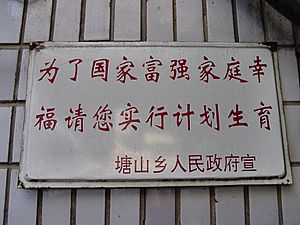One-child policy facts for kids

"For a prosperous, powerful nation and a happy family, please use birth planning."
The one-child policy was a special rule about families in China. It was also called the family planning policy. This rule started in 1979 in the People's Republic of China. Before this, China's leader, Mao, believed that a bigger population made a country stronger. However, China's population grew very fast, especially after the Second World War. Soon, there weren't enough resources like food and water for everyone.
To help control this fast growth, the one-child policy was put in place. It meant that most families in China were only allowed to have one child. There were some special situations where families could have more children. If a couple wanted more than one child, they usually had to pay money to the government. In some areas, families could get a special permit to avoid this fee. The policy helped prevent about 400 million births. About 36% of China's population was affected by this rule. However, it did not apply to places like Hong Kong, Macau, or Tibet.
Contents
Why China Introduced the One-Child Policy
Controlling Population Growth
China's population grew very quickly after the 1940s. By 1979, there were so many people that the country was struggling to provide enough resources for everyone. This is like a very crowded bus where there isn't enough space or seats for all the passengers. The government decided they needed to slow down how fast the population was growing. The one-child policy was their way to try and manage this big challenge.
Ensuring Enough Resources for Everyone
With a huge and growing population, China faced problems with having enough food, water, and housing. The government worried that if the population kept growing so fast, there wouldn't be enough for everyone to live comfortably. The policy aimed to make sure that the country's resources could support its people better.
How the Policy Worked
Rules and Exceptions
The main rule of the policy was simple: one family, one child. But there were some exceptions. For example, if a family's first child was a girl, they might be allowed to try for a second child, hoping for a boy. This was because in Chinese culture, sons were often seen as important for carrying on the family name. Also, families from certain ethnic groups or those living in rural areas sometimes had different rules.
Paying for More Children
If a family had more than one child without an exception, they usually had to pay a large fee to the government. This fee was called a "social compensation fee." It was meant to discourage families from having more children than allowed. In some places, officials worked to collect these fees from families.
Changes to the Policy Over Time
Aging Population Concerns
After more than 30 years, the one-child policy started causing new problems for China. One big issue was that the population began to get older. With fewer babies being born, there were fewer young people to support the growing number of elderly people. This meant there might not be enough workers in the future to keep the economy strong.
Workforce Needs and Economic Growth
As China's economy grew very fast, it needed a lot of workers. But with fewer young people, the country started to face a shortage of workers. This made the government rethink the one-child policy. They realized they needed more young people to join the workforce and help the country continue to develop.
The Shift to a Two-Child Policy
Because of these new challenges, China decided to change the policy. In 2015, the government announced that the one-child policy would be removed. Starting in January 2016, couples were allowed to have two children. This new rule is known as the two-child policy. It was a big change after more than three decades of the one-child rule.
Images for kids
-
A propaganda painting in Guangdong Province promotes the idea of a nuclear family with a single child.
-
The one-child policy was supported by Deng Xiaoping, a very important leader in China. In 1982, China's population reached over 1 billion people. That same year, family planning became a main policy for China and a duty for its citizens.
See also
 In Spanish: Política de hijo único para niños
In Spanish: Política de hijo único para niños
 | Frances Mary Albrier |
 | Whitney Young |
 | Muhammad Ali |





